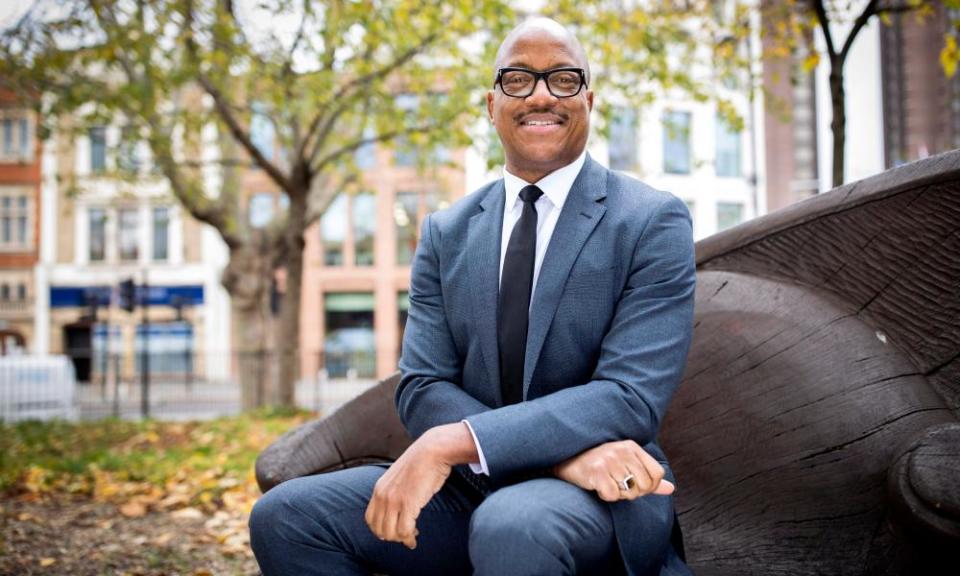'We need to be honest': the PHE expert shining light on Covid and inequality

Prof Kevin Fenton, Public Health England’s regional director for London, has lived in a lot of places over the past five decades. Born in Glasgow in 1966, he went to school and university in Jamaica, and worked in public health in the US for 10 years. But it’s the UK, where he gained his PhD, that he calls home.
He was particularly moved and humbled to be named the second most influential black Briton in this year’s Powerlist, behind the Formula One driver Lewis Hamilton, and followed by the grime artist Stormzy, the actor and screenwriter Michaela Coel, the editor-in-chief of British Vogue, Edward Enninful OBE, and the chief executive and general secretary of the Royal College of Nursing, Dame Donna Kinnair.
This year’s list honoured people who have spoken truth to power at a time of increased debate about racial injustice, the list’s publisher, Powerful Media, said.
“It’s nice to be recognised, but more importantly, it’s nice to be represented in this group because it’s not just sports people or people who are cultural icons. We have people in the health service, we have people from other walks of life, and I think that shows the rich diversity of black leadership within our society,” Fenton said.
He was recognised for his work in tackling the coronavirus pandemic, and particularly its devastating impact on black, Asian and minority ethnic (BAME) communities. Fenton has authored two reports on Covid-19 and inequality, the second of which included evidence from about 4,000 people, including Britain’s BAME groups and academics. “Somebody said to me in one of our interviews: ‘You’re one of the first people from government to ask us why and to listen to our stories’,” he said.
The report concluded that racism and discrimination suffered by people of colour contributed to the high death rates from Covid-19 in those communities.
“The reports came out at the same time as the Black Lives Matter movement … So I think the conversations were real, they were authentic and it provided us with a way to say there are economic disparities, there are disparities in living conditions, but also people of colour are tackling other issues, including risks which influence their outcomes and we need to be honest about that as well,” Fenton said.
Fenton was not surprised by the evidence that showed deprived areas were more likely to be affected by the coronavirus. “Having worked in infectious diseases for 25 years, I knew very well that those diseases and infections are not randomly distributed in the population. They find themselves concentrated – especially in those who have poor access to services, those who are socially and economically disadvantaged, or those not able to take full advantage of some of the preventive measures that we may have,” he said.
Fenton added: “What we didn’t appreciate was that the inequalities would have been so stark, so quickly.” During the first wave of the pandemic, a disproportionate number of people from minority ethnic background who were key workers and consultants died from the virus. “So you had both ends of the economic spectrum being involved.”
This is not the first pandemic Fenton has dealt with. While in the US, he led the Act Against Aids initiative with the Centers for Disease Control and Prevention, between 2004 to 2008. At the time the focus was largely on developing countries, but Fenton pointed out that the US had a domestic epidemic of Aids, disproportionately impacting the African American community, which also needed attention.
While the links between inequalities, race and health were well-established in the US at the time, Fenton did pioneering work in engaging with the black community to raise awareness and improve access to healthcare.
“[The initiative] really brought together the pillars of African American communities to say, ‘listen, there’s a crisis in our midst and we need now for you to take on the banner to help us to talk about HIV, to address stigma, to improve diagnosis and linkage to care, and to improve outcomes.’” This meant working with historically black colleges, religious institutions and local businesses to develop programmes with and by black Americans.
After a decade in the US, he could no longer ignore the call to return to London. “The longer I was in the US, the more I realised that my values, my sense of self, what I wanted to accomplish, was going to be back here in London,” he said.
Fenton was particularly keen to bring back some new thinking and energy from the US to the UK. He waited for the right opportunity and that came with the development of a new public health body, PHE. He has been working at the body since 2012.
His focus now is on protecting vulnerable communities during the second wave and preparing for the roll-out of vaccine, when one becomes available. He is particularly keen to work with local communities to build up trust and ensure they take full advantage of it when it becomes available.
He describes the inclusion of healthcare workers in the power list as a huge triumph in a particularly difficult year.
As well as his colleagues, his parents are especially proud. “I’m sure they must think, ‘How can this be the same Kevin we had on our knees a few years ago?’”

 Yahoo Finance
Yahoo Finance 